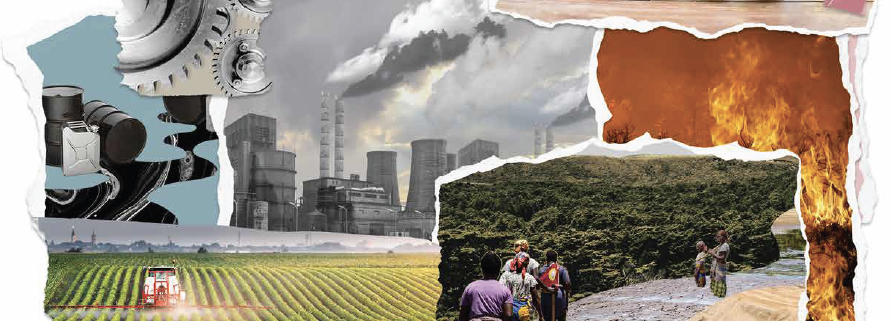Even the most ardent climate change denialists would have been stumped by the extraordinary weather patterns across Europe, the Americas, and Asia in July. It is now in the history books that July 2023 was the hottest month since records began. As global temperatures increase, the United Nations has warned that the years 2023 to 2027 will be the warmest five-year period ever recorded.
For millions around the world, climate disasters such as droughts, heatwaves, wildfires, flooding, and hurricanes continue to hit at an unprecedented scale, leaving behind a trail of destruction. As expected, the most affected are the poor, especially in the Global South, who have contributed the least to the climate crisis.
The time to act to reverse this dramatic trend is now.
The discourse on factors fuelling the climate crisis has mostly focused on fossil fuels, as the largest contributor of greenhouse gas emissions. Meanwhile, the role of industrial agriculture has somehow managed to fly under the climate radar, despite it being the second largest contributor to global greenhouse gas emissions.
Many people are led to believe that fossil- and chemical-intensive industrial agriculture is the panacea to food insecurity. But in fact, it is worsening climate change and causing widespread destruction of natural ecosystems, driving land grabs, threatening livelihoods, and contributing to severe health risks. Millions of people still suffer from hunger and malnutrition, as food insecurity is a problem of equitable access and distribution, rather than production. It is now clear that industrial agriculture is the problem and not the solution.
Fossil fuel and industrial agriculture corporations must stop wreaking havoc, and governments must reform energy, agriculture, and climate policies to constrain these destructive actors. But we also know that money talks. As long as massive financial flows continue to finance these climate-wrecking corporations, the problem will continue.
According to new research by ActionAid, “How the finance flows: The banks fuelling the climate crisis”, since the Paris Agreement was concluded in 2015, the world’s biggest banks have provided US$370 billion to industrial agriculture activities in the Global South. In the same timeframe, a further US$3.7 trillion has funded fossil fuel activities in the Global South. This is more financing to fossil fuels and agribusiness activities in the Global South than Global North governments have provided as climate finance to address issues of loss and damage, climate adaptation, and climate mitigation. This is absurd. This is suicidal.
The world’s money flows must move away from funding the biggest drivers of the climate crisis and destruction and move towards funding the future of our planet. It is time to call for banks to stop financing harmful agribusiness and fossil fuels. And it is time for governments to ramp up support for real and sustainable solutions such as agroecology.
One wonders why governments have delayed placing their trust in agroecology, which has proven so potent in addressing food insecurity and empowering the vulnerable, especially women and youth.
The answer lies in the notion that agroecology – in which farmers use sustainable practices to farm with nature instead of against it – cannot feed nations at the scale that industrial agriculture is believed to. However, food crisis, poverty, and malnutrition are increasing. One-third of the food produced is lost or wasted, and a big chunk of industrially produced food goes to feed animals and cars, while a few multinational corporations are increasing their profits on an unprecedented scale. Research has shown that smallholder farmers produce approximately 80 percent of the food supply in Asia and sub-Saharan Africa despite the lack of financial and political support, yet they are among the poorest in the world.
To unleash the potency of agroecology as a viable alternative, there needs to be more financial support. It is crucial to channel public financing into the development of sustainable food systems grounded in agroecology and food sovereignty. These systems prioritize the well-being of individuals, especially smallholder producers and consumers, as well as the health of our soils and the environment. This shift aims to replace harmful chemicals with sustainable alternatives.
As ActionAid launches its Global Climate Justice Campaign to defund the drivers of climate change, the world must take heed and embrace the opportunity to pursue sustainable, women-led, ecologically sound, and fair alternatives.
This is a clarion call to take a moment and reflect on the “Only One Earth” slogan from the 1972 United Nations conference on the human environment. Unless we act now, future generations will not have much left to inherit.









